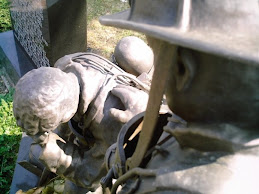By Joseph Kellard
“Breathing is first, winning is second,” New York Yankees owner George Steinbrenner once said.
That comment captures the essence of Steinbrenner, who died of a heart attack today at 80. If you want to know why the Yankees have become the most successful sports franchise in the world, it is that worship of winning, above all else, that explains it. It is what I and many others will and should remember most about the legendary and controversial owner.
“George never accepted second best,” said Mike Francesa, a sports radio host in New York. “And he always made it very clear he was going to demand performance. And when you have ownership that demands performance, you win. When you have ownership that’s complacent, you lose.”
That is the bottom line in professional sports, although many Yankees and Steinbrenner critics say that their success is due to another bottom line, the one that makes the Bombers the team that spend the most money on payroll each year. But Steinbrenner became the greatest owner in sports, not because of his bank account, but because of his will and efforts to win.
“He never stopped trying,” Steinbrenner once said his tombstone should read.
I became a Yankee fan when I was a young boy, a few years after Steinbrenner bought the team for $8 million in 1973. Within the span of a few years, he made the once proud and highly-successful franchise relevant again. New York won the American League pennant in 1976, followed by two World Series titles in 1977 and 1978.
Steinbrenner developed a reputation as a volatile owner, one who would stooped to sometimes petty, nasty behavior toward his players and managers. He fired and hired Billy Martin five times, and overall he changed managers more than 20 times. During the 1980s, his team went into a doldrums, and Steinbrenner was known as a meddling owner, which kept managers and players from wanting to wear the pinstripes. The lowest point came in 1990, when Steinbrenner was banned from baseball after he had paid a gambler to dig up controversial information about one of his players, Dave Winfield, in an effort to smear the slugger.
Nicknamed “The Boss,” Steinbrenner evolved into a larger-than-life figure whose fame went beyond sports, a persona that would come to be parodied on the hit comedy sitcom “Seinfeld.”
After his return to baseball in 1993, Steinbrenner mellowed, at least enough to take a more hands-off approach and allow his baseball personnel to make their own, independent decisions. The newer, more patient Steinbrenner was a reflection of another side to the man, one who is described as enormously caring and generous by players and others who knew him best. The result was four more World Series championships from 1996 to 2000.
While the Yankees had already been the most successful franchise in sports long before Steinbrenner bought the team, with 20 championship banners waving in their famed stadium, he took the team to a new level of success in the modern era. Steinbrenner is capitalist who made the Yankees into a worldwide brand with an estimated worth today of $3 billion. The YES Network that he created in 2002 has played a large part in that success, and today the team draws 4 million fans to Yankees Stadium.
“Later on, he understood the new economics of baseball better than anybody else,” said Franseca, whose radio show is aired on Yes, “and he’s made it work with the network, with the branding of the team, with every move he’s made.”
The critics relish any opportunity to say that the Yankees’ success is due to all the money they spend. The Yankees did just that in 2009 and won another World Series. But they also spent the most money of any team for eight years prior but never won a championship. True, they made it to the playoffs all but one year, including two World Series, and there is no doubt that spending the most money puts a team in the position to win. But there are other significant factors involved that make up a championship team, one of which includes having the right players come together to play as a winning team, superstars or not. But, above all else, the will to win has to undergird it all. This is what the Yankees, through good times and bad, have always had under Steinbrenner.
“George was not in it for the money,” Franseca said. “I know that sounds crazy … George was in this because he loved the game, he loved the competitiveness, and he loved the brand and he wanted to win, first and foremost he wanted to win.”
Other baseball owners are as wealthy as or wealthier than Steinbrenner, but he knew that in order to get results and to make even more money, you must spend and invest money – and to do so wisely. And along with that came Steinbrenner’s famous will to win.
In remembering The Boss today, Derek Jeter, who has won five World Series with the Yankees since he started playing shortstop for the team in 1996, said: “Everyone knows how tough he was … But you understood where it came from. He wanted to win, and he expected perfection.”
Tuesday, July 13, 2010
Subscribe to:
Post Comments (Atom)































+-+June+2009.jpg)











3 comments:
Great piece and so timely!
Thank you.
Thank you.
Post a Comment